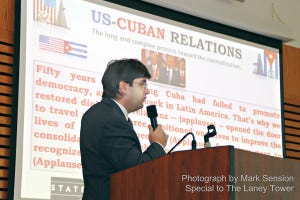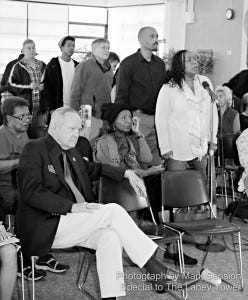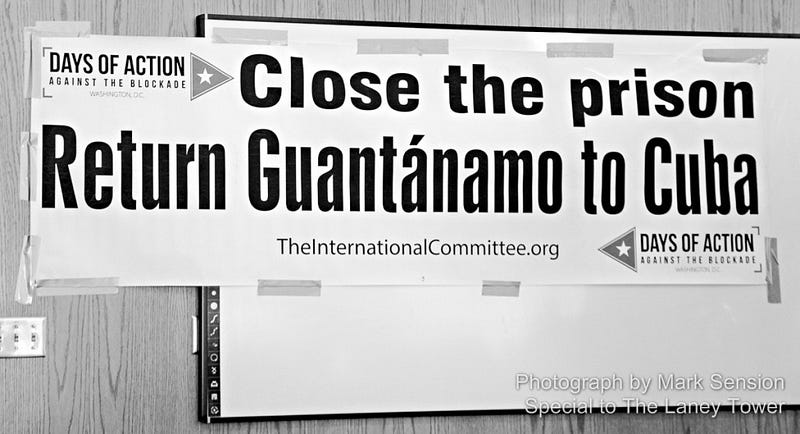First U.S. Cuban embassy secretary talks new relations with U.S.
 Has U.S. policy toward Cuba really changed? This provocative question served as the title of a landmark event at Merritt College: a visit from and lecture by the first Secretary of the Cuban Embassy, Miguel Fraga, on March 9.
Has U.S. policy toward Cuba really changed? This provocative question served as the title of a landmark event at Merritt College: a visit from and lecture by the first Secretary of the Cuban Embassy, Miguel Fraga, on March 9.“Many people today are saying relations are changing and now there are going to be Starbucks and America’s going to take over,” Merritt College Professor of Ethnic Studies Siri Brown said in her introduction.
“You don’t know Cuba!”
Brown hit the touchstones of U.S.-Cuban relations, declaring support on the behalf of her department on ending the economic blockade against Cuba, closing Guantanamo Bay, and ensuring Cuba preserves its sovereignty and control over its country even as the U.S. becomes a greater influence on its people.
 “Enough of the U.S. government telling everybody what to do,” Brown said to cheers. “Don’t underestimate the Cuban people.”
“Enough of the U.S. government telling everybody what to do,” Brown said to cheers. “Don’t underestimate the Cuban people.”Roused by Brown’s lively introduction, the large audience in the room graciously welcomed Fraga to the stage.
“I agree with everything she just said,” he commented, to a loud laugh from the audience.
He opened his discussion with a question: “What do you really know about Cuba?”
Fraga hoped his visit and lecture — part of a five-day tour of the Bay Area — would help dispel rumors about Cuba, and paint a more accurate picture of a country many Americans know only through symbols like Fidel Castro and expensive cigars — or even I Love Lucy.
“People don’t have enough information about Cuba,” he said. “What you have is what the media wants to [portray] and I always say, ‘Look beyond the headlines.’”
For example, many still believe that Cubans live under a highly oppressive regime that denies its citizens the basic human rights afforded to U.S. citizens.
But Fraga proudly boasted about high standards of living in Cuba, many of which surpass what one finds in the United States. Virtually all Cubans are literate, they have a life expectancy of 79 years, and their infant mortality rate is one of the lowest in the world.
Fraga explained that Cuba has “spends 12.8 percent of our [gross domestic product, or GDP] on education.” Quoting statistics from the World Bank, Fraga said “that was the highest investment in education worldwide.”
 “We spend 8 percent of our GDP on health, and we only spend 4 percent of our GDP on the military,” he said. “You can see very clearly what are Cuban priorities.”
“We spend 8 percent of our GDP on health, and we only spend 4 percent of our GDP on the military,” he said. “You can see very clearly what are Cuban priorities.”To the left of Fraga, a showy banner called attention to another important priority looming over both Cuba and the United States. The banner proclaimed, “Return Guantanamo to Cuba,” put up by the International Committee for Peace, Justice and Dignity (ICPJD).
Guantanamo Bay was opened in 2002 by the U.S. government as a way to hold and eventually try potential war criminals on foreign soil. The loophole allowed the U.S. to elude laws that govern the treatment of prisoners here.
The facility has been a source of controversy for the constant human rights abuses taking place there, including the indefinite detention of prisoners who have not been charged or convicted of any crimes and the violent force-feeding of inmates who have been on years-long hunger strikes. Although President Barack Obama ran for office on promises that he would finally shutter the prison, Guantanamo Bay continues to operate, with 93 inmates inside.
The ICPJD brings together activists across the globe fighting to bring awareness to this issue, as well as to end Cuban blockades and report on their negative effects on both Cuba and its neighbors. According to the U.S. Chamber of Commerce, the blockade costs the U.S. $1.2 billion in lost sales and exports.

























